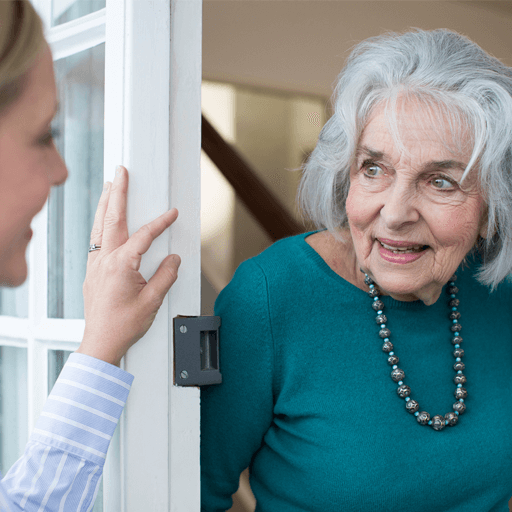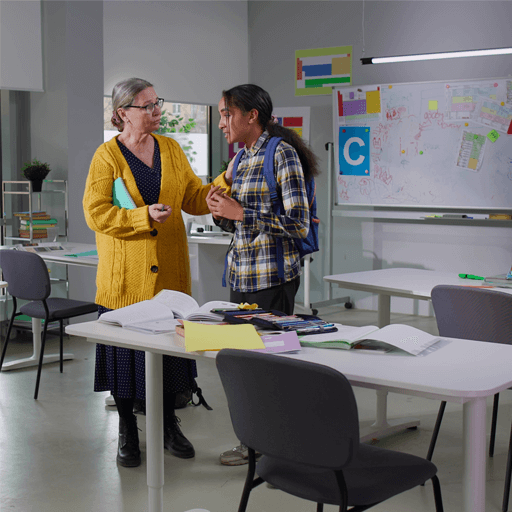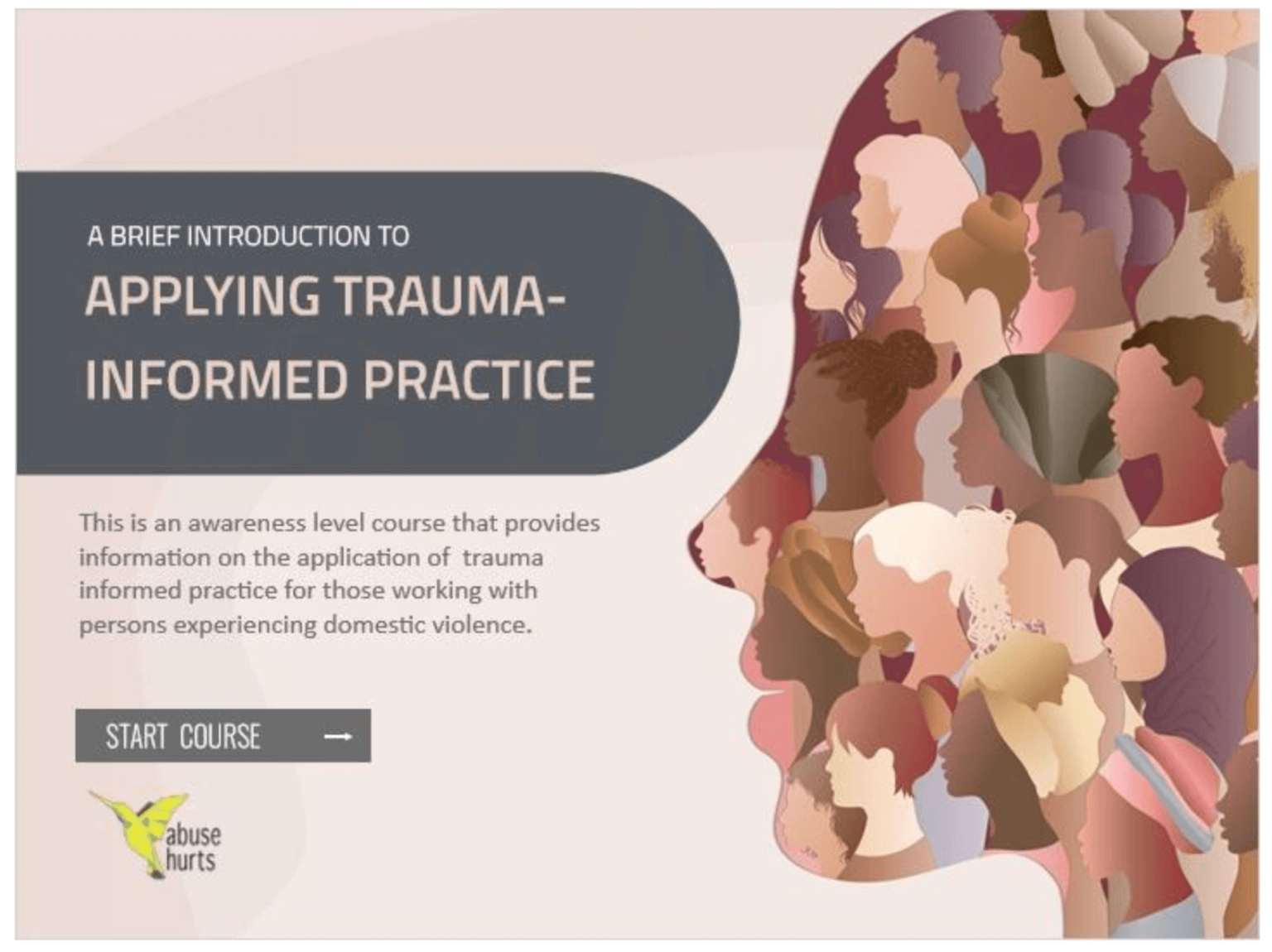Breaking Silence
Building Communities
Make a difference be a leader
Videos
Domestic Violence
Leadership Playlist
Listen to this impactful collection of conference sessions from our conferences, which highlight how community leaders can take steps to support survivors and factors that contribute to domestic and intimate partner violence.
Awareness Campaign
Make a Difference | Be a Leader Awareness Campaign
Check out these resources available for use by partner organizations and leaders in the community to increase awareness and provide tangible steps to take that we believe can help start to make a difference in our communities.
eLearning
Applying Trauma-Informed
Practices
Learn about Trauma Informed Care and how it can be applied by service organizations (including healthcare, first responder and education sectors) to improve the care and support to women who have experienced interpersonal violence.
Breaking Silence. Building Communities.
Violence against women is a significant issue in Canada, which is evident in the various statistics available to all of us. Recent numbers from 2022 tell us that a woman or girl is killed every 48 hours through gender-based violence by all types of people however, 90% of the accused are usually male (Canadian Femicide Observatory for Justice and Accountability, 2024) . We learned that with intimate partner violence specifically, we see statistics that say “on average once a week” (Canadian Femicide Observatory for Justice and Accountability, 2024) or “one every six days.” (Canadian Womens Foundation, 2024) These statistics are unacceptable.
Our page provides a set of tools and resources that were identified and developed through community engagement. The tools are designed to help leaders in our community including those who work in healthcare, education, and first responder sectors, understand the gravity of intimate partner violence, support survivors and take intentional action toward the prevention of domestic or intimate partner violence. If
you would like to learn more about the statistics related to domestic violence, please visit trusted resources such as The Canadian Women’s Foundation, The Canadian Femicide Observatory for Justice and Accountability and our project funder Women and Gender Equality Canada.
Our Journey
In 2022, we received funding from Women and Gender Equality Canada to lead a project that explored community-based approaches to address barriers faced by women experiencing domestic or intimate partner violence. To do this, we engaged a broad range of stakeholders (national and regional) to participate in knowledge transfer conferences, surveys, and product development activities. We also actively built relationships with our peer organizations to collaborate in the development of resources.


Through the knowledge transfer conferences and stakeholder engagement, we learned that focusing on prevention, taking new approaches and creating community-focused solutions were essential to both survivors and community partners. There was also a strong desire to make domestic or intimate partner violence a leadership issue – one that drew people in, gave marginalized girls and women a voice, and helped leaders within the community increase their knowledge and take action.
Our Goals
Increase knowledge and awareness among healthcare, first responders and educators regarding interpersonal and intimate partner violence, specifically as it relates to challenges experienced by marginalized girls and women.
Improve equality and equity regarding early detection and prevention of intimate partner violence.
Develop and implement leading practice tools to assist in intervention and prevention of intimate partner violence that creates an environment that provides access to all women.

Creating Space for Her To Talk

Normalizing Conversations about Domestic or Intimate Partner Violence

Promoting Self-love and Healthy Boundaries

Stay Connected and Check In

Educate Yourself so You Can Take Swift Action

Identifying and Reporting Abuse
eLearning
A Brief Introduction to Applying Trauma-Informed Practice eLearning
This short awareness-level eLearning course will only take 15-30 minutes to complete. The purpose of this course is to share what we have learned about trauma-informed practice and how it can be used to support those experiencing domestic violence. It is not designed to be a comprehensive learning on trauma-informed practices, principles, or how to develop a trauma-informed program.
External Resources
Discover additional list of external resources below. These resources provide valuable insights and tools for furthering your understanding of domestic and interpersonal violence prevention. Explore a wealth of knowledge to enhance your efforts in creating safer and healthier communities for all.
Waterloo Community Legal Services: Moving out because of fear of violence or abuse
Waterloo Community Legal Services has a tip sheet that explains how a person experiencing domestic violence or sexual abuse may be able to end their tenancy early. The tip sheet explains how to complete a Form N15 – Tenant’s Notice to End my Tenancy Because of Fear of Sexual or Domestic Violence and Abuse – and what must be included when giving the form to their landlord. It also has information on the steps to take next and how the N15 might affect other tenants living in the unit.
Luke’s Place: Rural and remote survivors of intimate partner violence
Luke’s Place has a toolkit on how to support survivors of intimate partner violence who live in rural or remote areas. The first section of the resource explains how living in a rural or remote location, or in a small community, impacts women experiencing intimate partner violence. The second section of the resource focuses on ways to support violence survivors in these areas. The toolkit is part of Neighbours, Friends and Families (NFF), a program of Western University’s Centre for Research and Education on Violence Against Women and Children. The program offers training for anyone who is concerned about a person experiencing intimate partner violence.
EQUIP Health Care: Trauma-and Violence-Informed Care (TVIC) Tool
This tool helps to give you clear, practical steps you can take to build TVIC into your practice and organization.
The Learning Network
The Learning Network is a knowledge mobilization initiative that bridges the gap between current gender-based violence (GBV) research, practice-based knowledge, and lived experience to enhance the capacity of the GBV sector and movement (e.g., legal help, shelter support, advocacy, education, sexual assault counselling). This knowledge is essential to preventing violence across diverse communities, supporting survivors and allies, and promoting gender equity.
Aura Freedom International
Aura Freedom is a grassroots organization working in Canada and internationally to end violence against women and human trafficking through advocacy and education.
Western University Centre for Research and Education on Violence Against Women & Children
It’s not right is a pan-Canadian approach to address abuse and neglect of older adults
Be a Leader
This page provides the resulting set of tools from our project work. These were identified through community engagement and are designed to help our community partners and leaders, including those who work in healthcare, first responders and education sectors, take action, support survivors and take steps toward the prevention of domestic or intimate partner violence.
Video Playlist
Experience the powerful discussions and invaluable insights showcased in our esteemed Hope Conference Series. Click on the recorded sessions addressing pivotal topics concerning domestic and interpersonal violence prevention. Each conference, Learn, Leverage, and Lead, offers recordings of distinguished speakers from across North America. We invite you to become educated and empowered as you explore our YouTube playlists, organized to provide you with resources and information on IPV/DV/GBV. Advance your knowledge to foster meaningful change within our communities.
BE A LEADER
This playlist includes selection of curated recorded sessions from our LEARN, LEVERAGE and LEAD Conferences that highlight how leadership and community leaders can have an impact on domestic and intimate partner violence.
LEARN
The LEARN conference focuses on understanding the current experience, sharing stories and identifying gaps and opportunities. This includes research, lived experience, existing approaches and how to mindfully make a change.
LEVERAGE
The LEVERAGE conference focuses on how we collaborate, break down stereotypes and build bridges in our communities.
LEAD
The LEAD conference focuses on how to move to action, breaking down inequality barriers, identifying leading practices for prevention, detection, and intervention, and exploring future possibilities.
Breaking Silence. Building Communities Project was funded by WAGE

Canadian Femicide Observatory for Justice and Accountability. (2024, April 19). Femicide is Preventable. Retrieved from https://femicideincanada.ca/
Canadian Women’s Foundation. (2024, April 19). The Facts about Gender-Based Violence. Retrieved from https://canadianwomen.org/the-facts/gender-based-violence/
Government of Canada. (2024, April 19). Women and Gender Equality Canada. Retrieved from https://www.canada.ca/en/women-gender-equality.html


Make a Difference | Be a Leader Campaign
The Make a Difference | Be a Leader Awareness Campaign was designed to support all community leaders, including those in the first responder, healthcare and education sectors. Our stakeholders identified that leaders in the community didn’t feel empowered to make change, were unaware that intimate or interpersonal violence was an escalating issue, and generally, there was a lack of awareness on how to take intentional action. Learn more about the campaign in the Guideline document included in the social media kit zip file.
Our Make a Difference | Be a Leader Campaign social media Kit provides the tools and resources to support community partners and other organizations who wish to increase awareness about domestic or intimate/interpersonal violence and intentional actions that leaders can take to prevent this from happening in their communities.
The social media kit includes a zip file of all campaign assets (29 Social media cards similar to the preview shown above, the Make a Difference Be a Leader Video and a Campaign guideline document). We encourage community partners to download the file, review the guideline document and utilize these assets to promote intimate partner prevention.
Tip Sheets
The following information sheets are designed to help community leaders educate themselves about domestic or intimate/interpersonal violence, as well as to provide guidance on how to take the beginning steps to support the prevention of domestic or intimate/interpersonal violence.